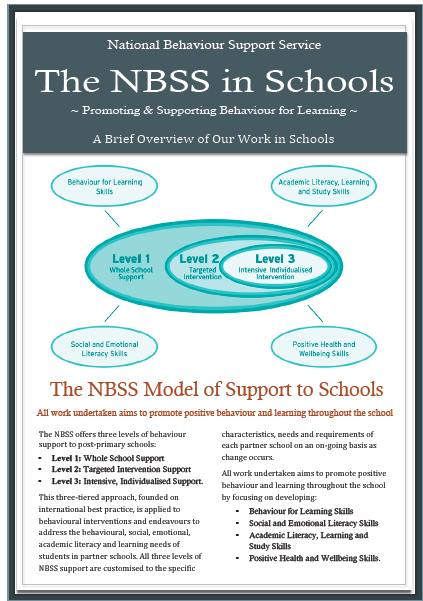What is the Behaviour for Learning Programme(BfL)?
A Behaviour for Learning Programme (BfL) consists of supports for students at 3 distinct different levels in Ramsgrange Community School and is under the guidance of the National Council for Special Education (NCSE).
Level 1: School-wide systems and practices that promote positive behaviour. ALL students in the school benefit from these supports.
Level 2: Group interventions for students with at-risk behaviours. SOME students access these supports.
Level 3: Individualised interventions for high- risk students. A FEW students receive support at this level.
The BfL programme is an intensive individualised intervention at Level 3 support. Characteristically, this level of support is offered to the small number of students who, notwithstanding school-wide behaviour support (Level 1 support) and targeted interventions (Level 2 support), continue to experience difficulty. These students have unique and multiple needs that call for an intensive, individualised intervention.
Students who are offered Level 3 support manifest a variety of challenging behaviours, including difficulties with social skills; low self-esteem; difficult relationships with adults/peers and poor concentration and attention problems in the majority of their subject classes.
Many of these students are also persistently at risk of suspension and/or explusion from school. The severity of their behaviour in classrooms not only hinders their own educational progress but may also impede that of their peers.
A BfL programme teacher has responsibility for the development of an academic, behavioural, social and emotional and well-being curriculum to meet the needs of targeted students. The fundamental aim of the BfL programme is to enable students to fulfil their potential and achieve success at school.
The BfL Programme should be seen across the school community as an intervention for rigorous learning.
Additionally, in order to avoid the creation of a ‘wait to fail’ intervention model, a school’s Behaviour for Learning Programme includes preventive strategies and early intervention approaches.
• The BfL programme is part of the whole school policy and strategy for positive behaviour.
• It is supported by the school management and is regularly reviewed by them.
• It is recognised by students, parents/guardians and all staff as an asset to the school.
• There is whole school understanding of the role and function of the BfL programme and all members of
the school community are aware of the principles and practice in the BfL.
• All teaching staff can benefit from and contribute to the work of the BfL.
• It is seen as a centre of excellence in the promotion of successful learning and behaviour strategies. The BfL programme teacher(s) share their expertise and support colleagues in improving behaviour for learning across the whole school.
• There is a suitably qualified and experienced full-time teacher in the BfL role.
• The referral process draws on baseline data provided by all subject teachers, including information about the student’s prior attainment and current progress, in order to develop an individual student behaviour plan (SBP) that will most appropriately address the student’s particular needs and facilitate achievement of goals and reintegration.
• There is a structured system for referral. Procedures and decisions will be formally recorded.
• Referrals are never made outside of these procedures unless in exceptional circumstances and only after consultation with the BfL teacher(s) and school management.
• Clear and documented entry and exit criteria and procedures with a focus on reintegration are established and disseminated across the school community.
• Students work to negotiated targets agreed with them and their parents/guardians. These are regularly reviewed and progress is recorded so that success, however small, is celebrated frequently.
• There is on-going monitoring and evaluation of Student Behaviour Plans (SBP), systems and strategies.
• Lesson plans are developed for all curriculum provision and skill development outlined in the SBP.
• There is continued support/provision for those students in receipt of Resource or Learning Support while attending the BFL room.
• Teaching in the BfL room draws upon a wide range of resources, including ICT, and strategies are developed to address the learning styles of individual students.
• There is a planned and phased reintegration back to full-time subject classes which is understood by the student and staff prior to attendance in the BfL.
• Regular contact is made with the student’s parent(s)/guardian(s), year head, class tutor and subject teachers.
These features should be viewed as the basic criteria for setting up and managing a Behaviour for Learning (BfL) Programme.






